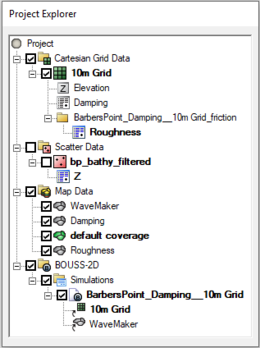SMS:Simulations
Starting in version 11.1, SMS has the capacity to run certain models as a simulation. A simulation includes the domain, boundary conditions, model parameters, event definition, and material set used for a single model run. Multiple simulations can exist within the same project in order to compare alternatives.
Working with Simulations
A simulation can be created by right-clicking on a blank portion of the project explorer and choosing the New Simulation sub-menu. The New Simulation menu will have commands to create a new model simulation. Selecting a model will cause a simulation folder for the chosen model to appear in the Project Explorer.
After a simulation has been created, components may be added to the simulation. Components are often created as map coverages, meshes, grids, or scattersets. The individual map coverages, grids, or scattersets can be linked to the simulation by clicking on the item in the project explorer and dragging it under the simulation item in the project explorer. This allows multiple simulations to make use of the same datasets.
Components can also be added or removed from a simulation using the right-click Link To or Unlink From submenus.
Once a simulation exists future simulations are often similar to one already created. Often it is easier to make a copy of the simulation and make changes where appropriate. A simulation can be copied by right-clicking on the simulation and choosing Duplicate.
The right-click menu for a simulation includes menu commands specific to each model.
Models That Use Simulations
Not all models usable in SMS can be created in the simulation format. Models that currently make use of the simulation format are:
| Model | Initial Version | Model Simulation Specifics |
|---|---|---|
| Bouss-2D | 11.2 | See BOUSS-2D Simulations |
| BOUSS Runup/Overtopping | 11.1 | |
| CMS-Flow | 12.1 | CMS-Flow Simulation |
| CMS-Wave | 12.1 | |
| EFDC | 11.1 | |
| SRH-2D | 12.0 | See SRH Simulation |
| TUFLOW | 11.1 | See TUFLOW Simulation |
| WAM | 11.1 | See WAM Simulation Model Control |
Related Topics
SMS – Surface-water Modeling System | ||
|---|---|---|
| Modules: | 1D Grid • Cartesian Grid • Curvilinear Grid • GIS • Map • Mesh • Particle • Quadtree • Raster • Scatter • UGrid |  |
| General Models: | 3D Structure • FVCOM • Generic • PTM | |
| Coastal Models: | ADCIRC • BOUSS-2D • CGWAVE • CMS-Flow • CMS-Wave • GenCade • STWAVE • WAM | |
| Riverine/Estuarine Models: | AdH • HEC-RAS • HYDRO AS-2D • RMA2 • RMA4 • SRH-2D • TUFLOW • TUFLOW FV | |
| Aquaveo • SMS Tutorials • SMS Workflows | ||
